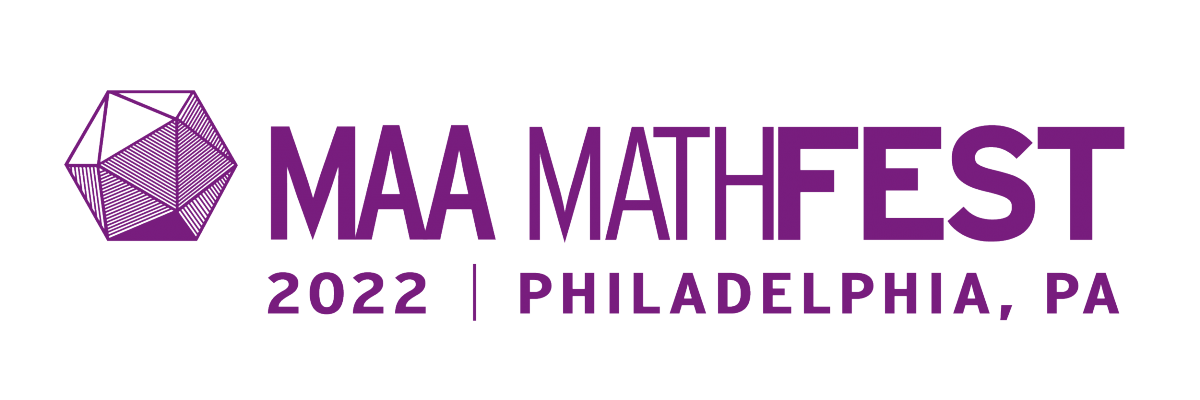- About MAA
- Membership
- MAA Publications
- Periodicals
- Blogs
- MAA Book Series
- MAA Press (an imprint of the AMS)
- MAA Notes
- MAA Reviews
- Mathematical Communication
- Information for Libraries
- Author Resources
- Advertise with MAA
- Meetings
- Competitions
- Programs
- Communities
- MAA Sections
- SIGMAA
- MAA Connect
- Students
- MAA Awards
- Awards Booklets
- Writing Awards
- Teaching Awards
- Service Awards
- Research Awards
- Lecture Awards
- Putnam Competition Individual and Team Winners
- D. E. Shaw Group AMC 8 Awards & Certificates
- Maryam Mirzakhani AMC 10 A Awards & Certificates
- Two Sigma AMC 10 B Awards & Certificates
- Jane Street AMC 12 A Awards & Certificates
- Akamai AMC 12 B Awards & Certificates
- High School Teachers
- News
You are here
Minicourses

Please note: All sessions are listed in Eastern Daylight Time (EDT = UTC-4:00)
Minicourses are highly interactive sessions designed in a two-part workshop format focusing on specific aspects of collegiate mathematics, the undergraduate curriculum, and mathematical pedagogy. These courses are taught by experts in the field, with two hours dedicated to each section. Separate registration and fee is required.
Space is limited.
Utilizing StatPREP’s Free Little Apps to Teach Data-Centric Statistics
Part A: Thursday, August 4, 9:00 a.m. - 10:50 a.m., Salon K
Part B: Friday, August 5, 10:00 a.m. - 11:50 a.m., Salon K
Statistics courses should be data-centric! This mini-course will expose participants to free tools from StatPREP (NSF DUE-1626337) to help students learn introductory statistics concepts. There will be hands-on computer activities utilizing Little Apps along with tutorials that introduce RStudio. This is a great mini-course to attend to learn how to incorporate real data into your course.
Organizers:
Kate Kozak, Coconino Community College
Ambika Silva, College of the Canyons
Visualizing Projective Geometry Through Photographs and Perspective Drawings
Part A: Thursday, August 4, 9:00 a.m. - 10:50 a.m., Salon L
Part B: Friday, August 5, 10:00 a.m. - 11:50 a.m., Salon L
Hands-on, practical art puzzles inspire the mathematics of projective geometry---the study of properties invariant under projective transformations. We explore activities in perspective art or photography that motivate concepts in projective geometry, including Desargues' Theorem and numerical projective invariants. Activities in problem solving and proof are suitable for a sophomore-level proofs class. No artistic experience is required.
Organizer:
Annalisa Crannell, Franklin & Marshall College
Teaching Mathematics Through the Lens of Social Justice
Part A: Thursday, August 4, 1:00 p.m. - 2:50 p.m., Salon K
Part B: Friday, August 5, 1:00 p.m. - 2:50 p.m., Salon K
This mini-course examines the myth that mathematics is apolitical. Participants will be led through a series of thought-provoking activities highlighting how to infuse social justice and equity into mathematics classrooms. Participants will bring to the mini-course a classroom activity, assessment tool, or teaching method and will be taught how to revamp this teaching artifact through a social justice lens.
Organizers:
Whitney George, University of Wisconsin - La Crosse
Mark Branson, Stevenson University
A Complex Transition to Advanced Undergraduate Mathematics
Part A: Thursday, August 4, 1:00 p.m. - 2:50 p.m., Salon L
Part B: Friday, August 5, 1:00 p.m. - 2:50 p.m., Salon L
A transition/proofs course exploring complex numbers opens doors to upper-level topics while deepening understanding of earlier material. Much looks familiar but requires careful reasoning. Complex-valued polynomials, rational functions, and basic transcendentals provide compelling content. Student experience with functions, visualization, sense-making, problem solving, working with definitions, proving, and connecting to prior knowledge all build “mathematical maturity”. Content options abound; instructors can flexibly adjust to student interests and experience. Students encounter examples of analytic and algebraic objects for later use and the content naturally supports a variety of teaching styles. Participants will engage with student-level materials and discuss instructor-level issues.
Organizers:
Paul Zorn, St. Olaf College
Bob Sachs, George Mason University
Re-imagining the Mathematics Curriculum in the First Two Years in Collaboration with Partner Disciplines -- the SUMMIT-P Model
Part A: Thursday, August 4, 3:00 p.m. - 4:50 p.m., Salon K
Part B: Friday, August 5, 3:00 p.m. - 4:50, Salon K
How do we create courses that serve diverse student goals in their studies, careers, and lives as informed citizens? The SUMMIT-P model is a multidisciplinary collaboration framework to re-imagine introductory mathematics courses. In this minicourse, participants will experience key elements of the model: ‘’fishbowl’’-style listening sessions, working through co-developed activities, exploring community-building strategies, and developing an action plan.
Organizers:
Victor Piercey, Ferris State University
Su Dorée, Augsburg University
Developing an Authentic Research Experience in your Undergraduate Courses
Part A: Thursday, August 4, 3:00 p.m. - 4:50 p.m., Salon L
Part B: Friday, August 5, 3:00 p.m. - 4:50 p.m., Salon L
Course-embedded Undergraduate Research Experiences (CUREs) have become popular in the hard sciences, but may be ambitious for math. This session is meant to give participants an idea of how one can adapt CUREs to math classes. The workshop will provide a Math CURE framework and then have participants create their own CUREs, rubrics and syllabus language while getting personalized feedback.
Organizers:
Lipika Deka, California State University, Monterey Bay
Peri Shereen, California State University, Monterey Bay
Jeffrey Wand, California State University, Monterey Bay
Year:
2022




